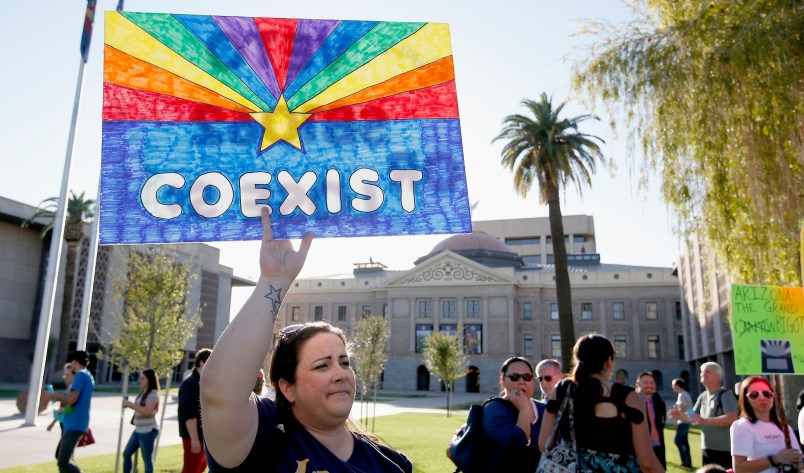If the events of the last week are any indication, the anti-gay movement personified in the Arizona bill vetoed by Gov. Jan Brewer Wednesday has already hit its high-watermark.
At the beginning of this month, by TPM’s count, bills had been introduced in at least eight states that would legitimize discrimination against LGBT people. The Arizona bill advanced the farthest, clearing the state legislature before Brewer rejected it with her veto stamp. The rest are dead or dying.
Though they expect future fights, gay rights advocates portrayed this week as a “turning point” in the debate.
“I suspect the bright spotlight that’s been put on the broad potential adverse consequences means that a great many legislators and most governors now will think much harder about these bills and be reluctant to endorse them,” Jenny Pizer, senior counsel at Lambda Legal, a gay rights organization, told TPM. “I do believe we’ve just witnessed a turning-point moment against these bills. But I also don’t expect the folks who hold this worldview to give up their political goals without further popular repudiation.
“We’ll probably see multiple further attempts before the book can be closed on this tactic.”
The “religious freedom” movement’s demise likely began with Brewer’s veto. She observed that her state’s bill “does not address a specific or present concern related to religious liberty in Arizona.” She added that it was “broadly worded and could result in unintended and negative consequences.”
With the Arizona bill igniting a national debate, those are the same kinds of criticisms that gay rights advocates have begun launching against the bills in other states. The proposals had largely flown under the radar until the Kansas House passed a bill earlier this month that would have explicitly allowed anti-gay discrimination on religious grounds.
That movement got the nation’s attention, and the very next day, a Kansas Senate leader said that the legislation wouldn’t pass through his chamber.
“I believe the intent of the House was to protect religious liberties. We respect that, but the business implications are going to harm the practice of employment in Kansas,” Sen. Susan Wagle, a Republican, said — a sign of things to come.
News outlets, including TPM, noted that similar bills had been introduced elsewhere, but the issue caught fire after the Arizona Senate and House passed their legislation — which was broader, but still would have allowed discrimination against gay residents — at the end of last week.
Soon, everybody had issued an opinion on such bills — and the response was almost uniformly negative. Public figures like 2012 GOP presidential nominee Mitt Romney and Arizona’s Republican U.S. senators voiced their opposition. A host of national companies, including American Airlines, Apple and the National Football League, urged Brewer to veto it. Only a small number of conservative purists — such as Rep. Michele Bachmann (R-MN) and the Heritage Foundation — continued to push for its enactment.
It was the former group, which included Arizona’s own business community, that won out.
“I sincerely believe that (the bill) has the potential to create more problems than it purports to solve,” Brewer said in her statement explaining the veto. “It could divide Arizona in ways that no one could imagine.”
As more bills were identified, the same kind of outcry has started knocking them down before they get as far as Arizona’s did.
The bills in South Dakota and Tennessee, which had mirrored the Kansas legislation, have stalled. Ohio lawmakers pulled their proposal, which was akin to the Arizona bill, on Wednesday after they received pushback from civil rights groups.
The business community, which used its influence to kill both the Kansas and Arizona bills, appears ready to scuttle legislation in Georgia and Mississippi. The latter bill was effectively gutted late Wednesday, and an official with the state’s chamber of commerce praised the revision.
The Georgia bill is still lingering in the Senate, but at least one major business group has already expressed strong opposition to it moving forward.
“We feel strongly that the laws of our nation and state already adequately protect the concept of religious freedom that this country was founded on,” the Metro Atlanta Chamber of Commerce said in a statement to TPM. “We encourage the General Assembly to reject proposals that would do little to enhance this basic right yet significantly threaten our business climate.”
The only bill not to suffer a significant setback is in Missouri, though it was just introduced Monday. However, it hasn’t yet been scheduled for a hearing, and gay rights groups are already mobilizing to stop it.






